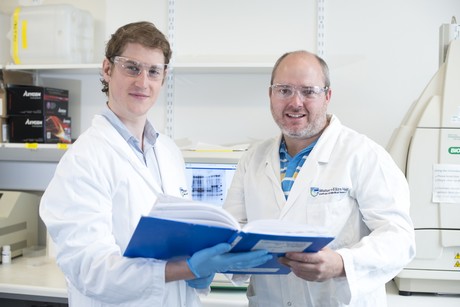Broken immune pathway could cause inflammatory diseases

Scientists at the Walter and Eliza Hall Institute (WEHI) have linked inflammatory diseases to faults in a critical immune pathway that enables inflammation to continue unchecked. The pathway in question is the NOD2 pathway, which detects and responds to bacterial invaders by releasing inflammatory signals to fight the infection.
Inflammatory diseases such as multiple sclerosis, Crohn’s disease (an inflammatory bowel disease) and inflammatory skin diseases have been linked to faults in how the NOD2 pathway is regulated. According to WEHI’s Dr Ueli Nachbur, such faults could enable our immune cells to continue to cause inflammation long after the bacterial threat has passed, leading to chronic inflammatory diseases.
“Inflammation occurs when our immune cells release inflammatory messengers, or cytokines, which is a normal response to disease,” Dr Nachbur said. “However, when too many cytokines are produced, inflammation can get out of control and damage our own body — a hallmark of inflammatory diseases.”
Dr Nachbur and his colleagues, including Che Stafford and Professor John Silke, showed that a protein called xIAP is the ‘master controller’ that initiates inflammation in immune cells via the NOD2 pathway. Their findings have been published in the journal Cell Reports.
“We revealed that xIAP was the key to initiating the inflammatory response in these cells,” said Stafford. “We also showed that, once the NOD2 pathway trigger is initiated, the cells need a second, amplifying step to complete a full-strength immune response.”
Knowing the key players in the entire NOD2 pathway, from initiators to enhancers, would pave the way for new strategies to treat inflammatory diseases, according to Stafford. He noted, “Targeting key components of the NOD2 pathway shows promise as a way of switching off ongoing inflammation associated with diseases such as Crohn’s disease and multiple sclerosis.
“In 2015 our research team showed that blocking a different protein in the NOD2 pathway could halt inflammation and was able to halt the progression of multiple sclerosis in a preclinical model. So it is very exciting to identify other potential targets for treating these diseases.”
According to Dr Nachbur, clarifying how the NOD2 pathway is regulated on a molecular level is important for developing new treatments for inflammatory diseases, which have a significant impact on people’s lives.
“xIAP has other roles in the cell, such as regulation of cell death, so it is a tricky target for treating inflammatory diseases,” Dr Nachbur said. “However, these new discoveries provide us with vital information to develop new treatment strategies that could lead to a safe and effective way of switching off inflammation for treating disease.”
The University of Sydney formalises cervical cancer elimination partnership
The success of a cervical cancer elimination program has led to the signing of a memorandum of...
Noxopharm says paper reveals science behind its immune system platform
Clinical-stage Australian biotech company Noxopharm Limited says a Nature Immunology...
Neurosensing/neurostimulation implants session to be held on Monday
On Monday, a session at UNSW Sydney will include people who are benefiting from bioelectronics...



